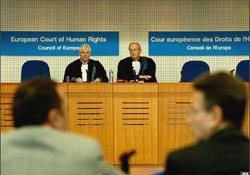 “Individuals’ access to the Court must be maintained, not curtailed by forcing applicants to pay to have their human rights cases heard or adding new admissibility criteria,” said Avner Gidron, Senior Policy Advisor at Amnesty International.
“Individuals’ access to the Court must be maintained, not curtailed by forcing applicants to pay to have their human rights cases heard or adding new admissibility criteria,” said Avner Gidron, Senior Policy Advisor at Amnesty International.
Fees – future of the Court?
Government representatives of the 47 member states of the Council of Europe gathered in Izmir, Turkey last week to discuss the future of the Court, including potentially damaging changes such as imposing fees on applicants and additional admissibility criteria.
Find more about the conference here.
“The European Court of Human Rights – though challenged by an increasing backload of cases – remains the jewel in the crown of the human rights protection system in Europe,” said Avner Gidron.
“States must not allow the ongoing process of reforming the Court to be used to address grievances against particular aspects of the Court’s rulings.”
Restricting individuals’ access to the Court would be unprecedented, ill-advised and risk undermining the protection of human rights in Europe. Fees would impose an additional barrier to justice which would be insurmountable to some, potentially leaving them without remedy for grievous violations.”
Right of individuals to apply directly to the Court essential
“Measures to secure the long-term effectiveness of the Court are required. But it would be wrong to treat the right of individuals to apply directly to the Court as the cause of the problems faced by the Court when this is the very reason for its existence.” said Avner Gidron.
The Court was set up in 1959 to enforce – through binding judgments – the European Convention on Human Rights, which all of the 47 member states of the Council of Europe are obliged to respect.
 Since its establishment, the Court has delivered more than 11,000 judgments ruling that states have failed to honour their obligations under the Convention.
Since its establishment, the Court has delivered more than 11,000 judgments ruling that states have failed to honour their obligations under the Convention.
Fatullayev’s case
Despite the fact that all member states of the Council of Europe are obliged to respect the rulings of the Court, Azerbaijan fails to do that. Journalist and editor Eynullah Fatullayev, right, remains in jail despite the Court’s judgment on 22 April 2010 ordering the Azerbaijani government to release him immediately.
Many international human rights organizations have raised their concerns regarding the Azerbaijani government’s non-compliance with the Court’s ruling in Fatullayev’s case. NGOs have urged Council of Europe member states not to turn a blind eye to Azerbaijan’s alarming freedom of expression record and the ongoing imprisonment of investigative journalist Fatullayev.
Find more about his case here.
Petition:
Related articles:
EC encouraged enhancing freedom of expression rights to internet users
Council of Europe adopted Resolution on the North Caucasus
Fatullayev’s case:
Fifty Fatullayevs protested the continued detention of Azerbaijani journalist
Azerbaijan: Free speech activists call on journalist’s release
Council of Europe Committee of Ministers calls for Eynulla Fatullayev’s release
Fatullayev’s fate – in the hands of the Council of Europe Committee of Ministers
Azerbaijan: Human rights organisations demand to comply with European Court decision
International freedom of expression organisations call for Eynulla Fatullayev’s release
Azerbaijani government uses refugee mobs to justify keeping journalist in jail
Azerbaijan continues to ignore its international obligations
Court slams Eynulla Fatullayev with another prison sentence
Georgian, Armenian and Azeri Human Rights Defenders Demonstrated in Geneva
Statements:
Joint open letter to President of Azerbaijan re Eynulla Fatullayev’s case
Request for immediate and unconditional release of Eynulla Fatullayev
Request for immediate and unconditional release of Eynulla Emin Fatullayev





